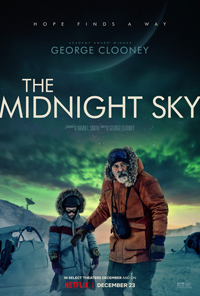World, Hold On: Clooney Presents the End Times in Tedious Apocalyptic Exercise
 It’s been a year wherein it seems the end we’ve forever been pondering from the heavens instead will likely arrive from within terra herself, which is an unfortunately dismal landing for the seventh directorial effort from George Clooney, The Midnight Sky.
It’s been a year wherein it seems the end we’ve forever been pondering from the heavens instead will likely arrive from within terra herself, which is an unfortunately dismal landing for the seventh directorial effort from George Clooney, The Midnight Sky.
Adapted from the novel Good Morning, Midnight from Lily Brooks-Dalton by Mark L. Smith, Clooney’s hollowed-out spectacle likely neglects what might have been a more beneficial literary experience than the pseudo-cerebral exercise unfolding onscreen. Despite an interesting cast, the limited narrative twists eventually feel demeaning thanks to their sheer obviousness, and the discordant technical attributes tend to distract in a film which often feels as if it could have done more with less.
In February of 2049, an extinction level event has occurred on Earth, and scientist Augustine Lofthouse (Clooney), suffering from a terminal illness, opts to stay behind in the Arctic Circle while his colleagues flee to one of many underground shelters. Alone at the Barbeau Observatory, he tries to contact any remaining space missions to inform them of the event, but finds only one operational, the Aether, returning from Jupiter where they have discovered a habitable moon. As he struggles to reach them, a young girl suddenly appears, apparently left behind by the crew members. With child in tow, Augustine makes a dangerous trek to a nearby weather station so he can access a more powerful transmitter. Along the way, we learn thirty years prior he was researching other habitable planets in the universe. Meanwhile, aboard the space craft, led by Commander Adewole (David Oyelowo), his quartet of crew members are growing concerned as they’ve lost contact with Earth. Minor distractions, such as a relationship with Sully (Felicity Jones), who is pregnant with his child, fall to the wayside when Augustine’s message finally reaches them.
As the withering scientist, Clooney’s Augustine feels like the somnolent hologram of a Christopher Nolan vehicle, his journey in the Arctic circle accompanied by an electively mute child whose suspicious presence heralds the worst possible tendencies of a narrative which insists on contrivance to connote what feels like some sort of existential treatise on fate. As tedious as Augustine’s plight seems to be, however, his face off with the elements are the few energetic segments peppered throughout The Midnight Sky.
What’s happening up in space on the woebegone Aether is pure cliché space hokum, including the grainy technological interfaces the crewmembers use to recreate images of loved ones in their mind’s eye. A damaged ship, a meteor storm during repairs, a claimed life amongst the crew—all this occurs without any real meaningful exchanges between any of them, with Tiffany Boone, Demian Bichir and Kyle Chandler mere place holders for events to act upon. Felicity Jones and David Oyelowo suggest some intrigue, a romantic exchange involving a pregnancy (an unwise choice which seems outright foolhardy once they discover what’s actually happening on Earth) and yet the script gives them no room for anything resembling a connection beyond robotic. Alexandre Desplat delivers one of his most disappointingly utilized scores, roaring from hokey joviality in our early explorations of the space craft to an eventual space cliché unto itself.
If Clooney is trying to wax Tarkovsky, he falls far shorter than even Soderbergh did in his own ambitious 2002 version, a film in which he himself was featured. Rather, Clooney draws direct comparisons in this film to the 1959 Stanley Kramer classic On the Beach, in which nuclear fallout finds mankind’s last stand on a drifting ship off the coast of Australia as they await their fate—Clooney even casts Ethan Peck as the younger, dubbed version of himself, notably the grandson of Gregory Peck, who led the Kramer flick. But this is only a minor, passing interest which does little to lift this narrative’s inert energy.
Mankind’s end is less defined other than a toxic event which has made Earth’s surface uninhabitable, and this vagueness suggests so much room for Clooney to play on a more meaningful, existential, or emotional level. But at the end of every end-of-the-world scenario, whether it’s the world surveyors circling the Earth’s contaminated atmosphere here or the Gerard Butler led civilians in this month’s Greenland, it’s assumed the ultimate goal is to make the audience care for the survival of at least some of its characters. Neither Clooney nor Ric Roman Waugh were successful in the latest portraits of our demise, suggesting something more troubling than the generalizations formatted in either an arguable arthouse film or run-of-the-mill mainstream spectacle – creators have lost the inability to generate enough energy to make us care.
★★/☆☆☆☆☆


